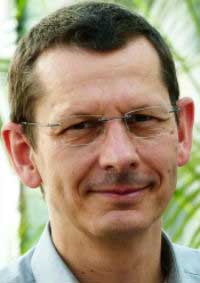Earth System Modeling
Lecturers: Michael Schulz
This course gives an overview of the basic components of the climate system, introduces nonlinear processes and feedbacks and proceeds from conceptual to comprehensive numerical models of the atmosphere, ocean, ice sheets and the Earth system. Computer exercises provide an introduction to scientific programming.
The course addresses SDG 13 (climate action) by covering the physical principles of the climate system and climate change.
- to obtain a basic understanding of the physics of the climate system
- to become able to assess the opportunities and limitations of numerical climate models
- to acquire essential skills in scientific programming
oral exam
mündliche Prüfung
Hartmann, Dennis L.: Global Physical Climatology. Elsevier, 2nd edition, 498 pp., 2016.
Open University: Ocean Circulation. Butterworth-Heinemann, 2nd revised edition, 286 pp., 2004.
Ruddiman, W.F.: Earth’s climate: past and future. W.H. Freeman, 3rd revised edition, 464 p., 2013.
An introduction to programming in Octave for students at the Department of Geosciences of the University of Bremen who take the course on earth-system modeling in the MSc of Marine Geosciences program
https://github.com/andre-paul/intro-to-octave
1st SWS: Earth-system overview / Discretization in time
2nd SWS: Introduction to programming I/ Introduction to programming II
3rd SWS: Transport processes: Mathematical description / Introduction to Programming III
4th SWS: Transport processes: Discretization in space
5th SWS: One-dimensional energy balance model
6th SWS: Nonlinear processes and feedbacks/Solar luminosity and climate
7th SWS: Atmosphere models / Increased greenhouse effect with ice-albedo feedback
8th SWS: Ocean models
9th SWS: Coupled climate models
10th SWS: Earth-system models
11th SWS:
12th SWS:
13th SWS:
14th SWS:
Notebook-Pool
Basic Data
05-MMG-CC1-1
Study Program
Master Marine Geosciences
Module Name
Climate Change I: Fundamentals
Course Type
Lecture, Exercise (L+E)
First Year of Study
4 CP
4 SWS
Winter Term
Course Language
English
Contact Person

Geosystem-Modellierung
Prof. Dr. Michael Schulz
MARUM ZfT 4270R
Phone: +49 421 218 - 65444
mschulz marum.de
marum.de
Geosystem-Modellierung
Prof. Dr. Michael Schulz
MARUM ZfT 4270R
Phone: +49 421 218 - 65444
mschulz marum.de
marum.deLecturer

Geosystem-Modellierung
Prof. Dr. Michael Schulz
MARUM ZfT 4270R
Phone: +49 421 218 - 65444
mschulz marum.de
marum.de
Geosystem-Modellierung
Prof. Dr. Michael Schulz
MARUM ZfT 4270R
Phone: +49 421 218 - 65444
mschulz marum.de
marum.de
